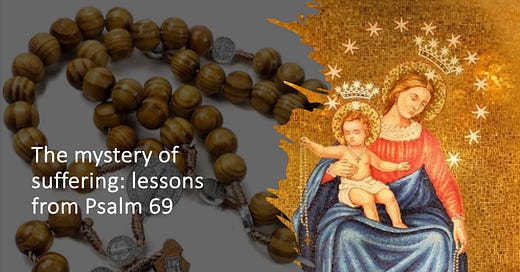The mystery of suffering: lessons from Psalm 69
October 7, 2023 - Saturday, Memorial of Our Lady of the Rosary
Psalm 69:33-35, 36-37
Psalms 69 reflects on a theme of the suffering of an innocent person. He did not do anything wrong and yet he is pursued by his enemies and became the talk of the town and an object of drunkards' songs (see Ps 69:3; 13). Although the psalmist acknowledged his folly and wrongdoings (see Ps 69:6), he ascribes his sufferings to his faithfulness to God. And perhaps that is the reason why this psalm is often quoted in the New Testament concerning Jesus’ suffering. Unlike the psalmist, our Lord did not commit any sin but “the insults of those who blaspheme” God fall upon our Lord Jesus Christ (see Ps 69:10; Rom 15:3).
The overall theme of the Jewish Scripture - what we call the Old Testament - is a theological reflection on the tragedy of the Babylonian exile. Why did it happen? Two basic answers seem to conflict with each other. One voice blames the sinfulness of God’s people. From Adam to the kings of Israel, people disobeyed God. This attitude towards God and His words is captured in a metaphor that calls Israel “a stiff-necked people” (see Ex 33:3).
But another voice disagrees with it. While acknowledging the sins of the people, this voice does not accept the severity of punishment. Yes, the people did not listen to God’s prophets. But the punishment - namely the destruction of Jerusalem, burning the temple, and taking the people as captives to Babylon - far exceeded what their sins deserved (see Is 40:2). Within this voice, we can include two more lines of thoughts. One sees the mystery of the suffering of a just person as beyond comprehension - that is the main theme of the book of Job. Another one looks at such suffering as a vicarious one for the sake of others (see Is 53).
Psalm 69 ends with a statement of hope that the Jewish exiles would return home, rebuild “the cities of Judah”, and live in the Promised Land again (Ps 69:36-37). And that is how the Jewish Bible ends. Unlike our Old Testament which ends with the book of the prophet Malachi, the last book in the Jewish Bible is the second book of Chronicles which ends with the edict of Persian king Cyrus issued in 538 BC that allows the Jewish exiles to return to the Promised Land.
Christian reading of this psalm can see here the Passion of Christ, the innocent victim of human sinfulness, who suffered the death on the cross for our salvation, and on the third day rose from the grave. We can also see in this psalm, the promise of final victory for all those who suffer because of their faithfulness to God. As the Jewish exiles could return home, so we can also return home, to our heavenly Jerusalem and inherit a new heaven and a new earth where justice resides (see 2 Peter 3:13).




